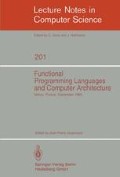Preview
Unable to display preview. Download preview PDF.
References
H.G. Baker, Jr. List processing in real time on a serial computer. Comm. ACM 21, 4 (April, 1978), 280–294.
D.G. Bobrow. Managing reentrant structures using reference counts. ACM Trans. Prog. Lang. & Systems 2, 3 (July, 1980), 269–273.
D.W. Clark and C.C. Green. A note on shared structure in Lisp. Inform. Proc. Lirs. 7, 6 (October, 1978), 312–314.
G.E. Collins. A method for overlapping and erasure of lists. Comm. ACM 3, 12 (December, 1960), 655–657.
L.P. Deutsch and D.G. Bobrow. An efficient, incremental, real-time garbage collector. Comm. ACM 19, 9 (September, 1976), 522–526.
L.P. Deutsch and A.M. Schiffman. Efficient implementation of the Smalltalk-80 system. Conf. Rec. 11th ACM Symp. on Principles of Programming Languages (1984), 297–302.
D.P. Friedman and D.S. Wise. Aspects of applicative programming for parallel processing. IEEE Trans. Computers C-27, 4 (April, 1978), 289–296.
D.P. Friedman and D.S. Wise. Sting-unless: a conditional, interlock-free store instruction. In M. B. Pursley and J. B. Crus, Jr. (eds.), Proc. 16th Annual Allerton Conf. on Communication, Control, and Computing, University of Illinois (Urbana-Champaign, 1978), 578–584.
D.P. Friedman and D.S. Wise. Reference counting can manage the circular environments of mutual recursion. Inform. Proc. Ltrs. 8, 1 (January, 1979), 41–44.
D.P. Friedman and D.S. Wise. An approach to fair applicative multiprogramming. In G. Kahn (ed.), Semantics of Concurrent Computation, Berlin, Springer (1979), 203–250.
D. Gries. An exercise in proving programs correct. Comm. ACM 20, 12 (December, 1977) 921–930.
A. Gottlieb, R. Girshman, C.P. Kruskal, K.P. McAuliffe, L. Rudolph, and M. Snir. The NYU ultracomputer—Designing an MIMD shared memory parallel computer. IEEE Trans. Computers C-32, 2 (February, 1983), 175–189.
P. Hudak and R.M. Keller. Garbage collection and task deletion in distributed applicative processing systems. Conf. Rec. 1982 ACM Symp. on LISP and Functional Programming (1982), 168–178.
R.J.M. Hughes. Reference counting with circular structures in virtual memory applicative systems. Programming Research Group, Oxford (1984).
D.H.H. Ingalls. The Smalltalk-76 programming system: design and implementation. Conf. Rec. 5th ACM Symp. on Principles of Programming Languages (1978), 9–15.
S.D.Johnson. Connection networks for output-driven list multiprocessing. Tech. Rept. 114, Computer Science Dept., Indiana University (October, 1981).
S.D. Johnson. Storage allocation for list multiprocessing. Tech. Rept. 168, Computer Science Dept., Indiana University (March, 1985).
A.T. Kohlstaedt. Daisy 1.0 reference manual. Tech. Rept. 119, Computer Science Dept., Indiana University (November, 1981).
H. Lieberman and C. Hewitt. A real-time garbage collector based on the lifetime of objects. Comm. ACM 26, 6 (June, 1983), 419–429.
D. Moon. Garbage collection in a large LISP system. Conf. Rec. 1984 ACM Symp. on LISP and Functional Programming (1982), 235–246.
H. Schorr and W.M. Waite. An efficient machine-independent procedure for garbage collection in various list structures. Comm. ACM 10, 8 (August, 1967), 501–506.
G.L. Steele, Jr. and G.J. Sussman. The revised report on SCHEME: a dialect of LISP. MIT A.I. Memo 452 (January, 1978).
W.R. Stoye, T.J.W. Clarke, and A.C. Norman. Some practical methods for rapid combinator reduction. Conf. Rec. 1984 ACM Symp. on LISP and Functional Programming (1982), 159–166.
N. Suzuki and M. Terada. Creating efficient systems for object-oriented languages. Conf. Rec. 11th ACM Symp. on Principles of Programming Languages (1984), 290–296.
J. Von Neumann. Theory of Self-Reproducing Automata (Edited and compiled by A. W. Burks), Urbana, Univ. of Illinois Press (1966).
J. Weizenbaum. Symmetric list processor. Comm. ACM 6, 9 (December, 1963), 524–544.
D.S. Wise. Morris's garbage compaction algorithm restores reference counts. ACM Trans. Prog. Lang. & Systems 1, 1 (July, 1979), 115–120.
D.S. Wise. The applicative style of programming. Abacus 2, 2 (Winter, 1985), 20–32.
D.S. Wise and D.P. Friedman. The one-bit reference count. Nordisk. Tidskr. Informationsbehandling (BIT) 17, 3 (September, 1977), 351–359.
Author information
Authors and Affiliations
Editor information
Rights and permissions
Copyright information
© 1985 Springer-Verlag Berlin Heidelberg
About this paper
Cite this paper
Wise, D.S. (1985). Design for a multiprocessing heap with on-board reference counting. In: Jouannaud, JP. (eds) Functional Programming Languages and Computer Architecture. FPCA 1985. Lecture Notes in Computer Science, vol 201. Springer, Berlin, Heidelberg. https://doi.org/10.1007/3-540-15975-4_43
Download citation
DOI: https://doi.org/10.1007/3-540-15975-4_43
Published:
Publisher Name: Springer, Berlin, Heidelberg
Print ISBN: 978-3-540-15975-9
Online ISBN: 978-3-540-39677-2
eBook Packages: Springer Book Archive

